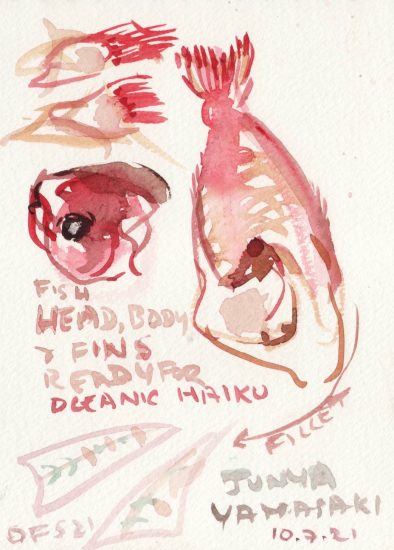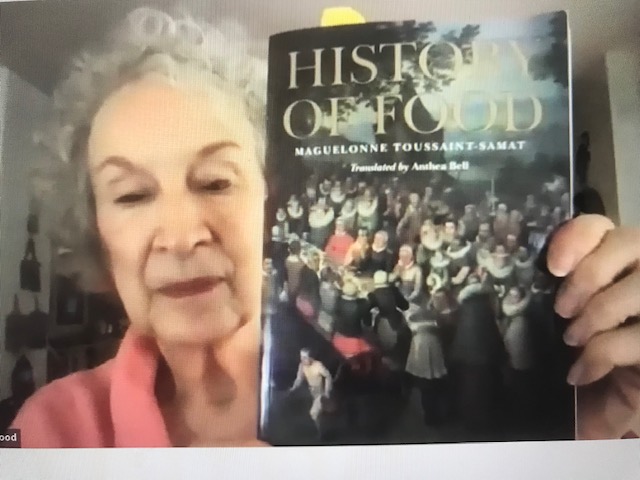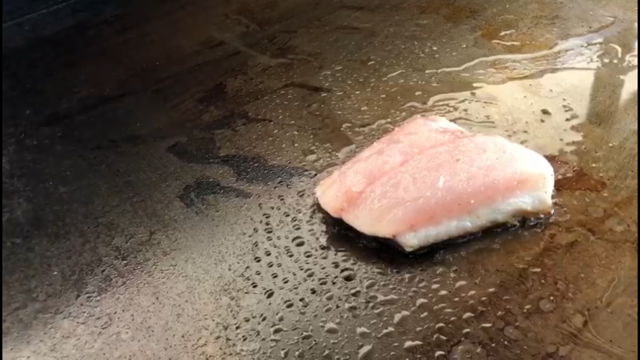
From the virtual OFS editing-suite with Elisabeth Luard and Gamze Ineceli: Volume 1
This is a new series of questions and comments from this year’s Food & Imagination chatlines. While we don’t record the discussion-sessions, the chatlines are recordable by everyone present.
From Speaker Margaret Atwood’s chatline (hosted by our papers-editor, Mark McWilliams):
How realistic “should” food be in fictional writing?…
How much does a character’s nature get reflected in the food they are given to eat in your books and does food ever drive the narrative?…
May I ask how you would react to an announcement that the headless chicken you envisioned in Oryx and Crake had been brought to life?….
As a secret sharer of the vice of fascination with shipwrecks and cannibalism – the whaling museum on Nantucket has an exhibit about the wreck and follow-up “meal” of the Essex -how has this interest influenced your fiction?…
Cannibalism is all over children’s literature – Three Little Pigs, Red Riding Hood; Beatrix Potter’s Peter Rabbit, Jemima Puddleduckwere all in danger of being cooked….
You mentioned that chefs influenced the acceptance of new foods (potatoes, peppers, maize, coffee etc): do you think writers of fiction or non-fiction also had an influence?…
Cooking, shopping and eating play an important part in The Handmaid’s Tale. When conjuring this foodscape were you thinking of a particular historical period and a particular place?…
Would it be fair to say that you have an ambivalent relationship with food? You’re clearly fascinated by it, but in some of your books (and notably Handmaid’s Tale) the realm of the kitchen is also a realm of female oppression?…
Note: Ms. Atwood’s choice of culinary reference books (good for anyone’s basic culinary literacy) are: Phillippa Pullar’s Consuming Passions, Dorothy Hartley’s Food in England, Maguelonne Toussaint-Samat’s History of Food (trans. Anthea Bell).

From the chatline on Fantasy Food:
Maybe dragons like charred bloody meat? Dragon-fired sheep are raw inside. I want to read a story where dragons have microwaves to cook their prey through. Microwave dragons! Fantasy and sci fi collide!…
True medieval manuscripts must be so rich and strange and wonderful, certainly more fascinating than anything a contemporary could imagine, surely? Using actual medieval recipes or ideas in fantasy novels may actually feel unbelievable to many readers….
I was on a science committee with a microbiologist for early space programmes, and he talked about efforts to avoid contamination from extraterrestrial bacteria – up to and including burning returning crew.
From the chatline on Hunger:
My mother was a terrible cook, my brothers and I share so many fond memories of her food-incidents, adventures, obsessions…
There are advantages to eating bad food. I wonder if I’d be so obsessed with it if I had had marvelous food at home. Bad food forced me to create good food….
There is a guy sometimes who sits outside our co-op supermarket and I take his order before I go in! He goes there because it has a hot cupboard and he, in common with many on the streets, is desperate for something heated. Easy to forget that.
From the chatline on Innovation:
Some restaurants during Covid lockdown could not afford the overhead of a non-functioning space. They dropped their physical street presence and continued via ghost kitchen. Here’s the kicker: the services who take your order and facilitate delivery are collecting your likes. It has been suggested these services are starting their own ghost kitchens feeding off this information and competing with their original source restaurants….
Ghost kitchen is also a way for an established brand to break into another market unencumbered by established conceptions of the existing brand. i.e., a fine dining restaurant doing a “street food” concept….
One forgets that there are parts of the world and society where people don’t have kitchens or cook: I always see eating out a luxury, but the ability to cook is also a luxury….
From Chef Junya Yamasaki’s chatline:
I am really excited to try the fish-frying method in the video. The details on listening to the sound of the fish as it fries as a way of understanding the temperature blew me away – music and poetry meeting in the pan…
Also the instruction to cook up to 90% without turning, really looking at the fish to see how its colour changes. Just so sensual…
We talked about recipes as multisensory instructions – and the limitations of written recipes as compared with learning from a teacher (like Junya) who shows and expresses all the sensory nuances of a dish…
I think the difference in how you experience time when reading a recipe is significant as well. Seeing and experiencing in real time is very different to reading an instruction that says do this for 20 minutes or whatever…
The French method can go on for weeks…
Chinese spiced broths (lushui 卤水) can also go on forever: just strained, replenished as you go. The aroma of the stock changes significantly over the three days…
I believe some ramen chefs have a perpetual broth as they do a sourdough starter: a base that gets added to and taken from, but originates from a ‘mother’ as it were…

